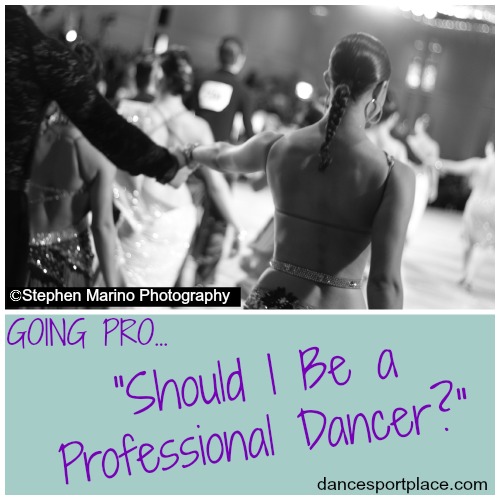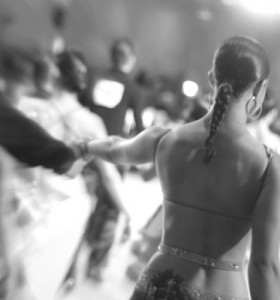Many dancers ask themselves and their coaches, “Should I be a Professional Dancer?” To be a dancer, you have to be passionate. What else inspires one to spend long hours in uncomfortable shoes, working an hour on the tedium of the perfect angle of your hip, wearing your heart on your sleeve for the audience while also wearing less then a yard of fabric- and don’t forget, being on a diet for your entire life! We dancers are a rare breed. Why do we do it? Because the joy of taking your physicality beyond what you imagined along with stretching your heart and soul, is a feeling so euphoric, that it is worth the sacrifice.

Lots of dancers out there have the passion for dance, but before you think about going pro, there is more to consider than just your undying love of dancing.
The Pitfalls:
Feast or Famine
If you are a working dancer, you have to be prepared for the lean times in between contracts, client fluctuation and while traveling. There will be times when you have a sweet gig, but once that contract is up, and if there is a lag between jobs, you’ll find yourself on three meals a day of Top Ramen. If you are an instructor, there will be times when you are in high demand as the teacher du jour, and other times when your schedule appears to evaporate before you eyes. It just seems to be the nature of the business. If you’re smart, you can learn to budget yourself and sock some savings away for the lean times. If you’re even smarter, you’ll develop your skills in other areas of the business to increase your value and expertise. Work towards your strengths. This will also serve you later when you transition out of a performing or competitive career.
Injuries
Getting hurt can keep you off the floor for a day or much longer. Even if you take care of yourself, it doesn’t guarantee that you won’t sustain an injury. Coming from a ballet background, I can say that we ballroom dancers have a much easier time of it than dancers of other styles, and greater longevity. But wear and tear will take its toll on every dancer. Sustaining injuries can take you out of work, lead to depression in addition to physical pain, and even diminish your confidence when you return to the dance floor.
Heartache
As a ballroom dancer, you’re part of a team-a team of two. When you spend that much time with a person, it often leads to more then just teamwork. Romantic partnerships are very common in ballroom and can lead to some beautiful amazing relationships (even marriages (coming from one who knows 🙂 Be prepared, though, as you might find breakups even more heart wrenching when you lose your lover and business partner at the same time. This shouldn’t be a reason for anyone to avoid a career in dancing, but you might think about the repercussions when it comes to how you approach your relationships.
Mental Toughness
Dancers have to be mentally tough in two distinct ways. One, is being able to handle rejection and criticism. The second is being able to handle constant scrutiny of one’s body and even looks.
First, rejection or disappoint is possible at every point of a dancer’s career. Just getting a job or getting to the next level competitively can be an exercise in persistence. You have to meet the expectations of not only a certain level of dancing, but your looks, grooming, everything is blatantly evaluated and weighed against the competition. As a dancesport competitor, you might find yourself having trouble moving past a plateau, become disheartened by seeing other couples move past you, or you simply may find it tough to achieve the placements you desire no matter what you do. After all, there can be only one champion at a time!
Secondly, when you spend hours a day looking in the mirror and analyzing the most minute movements, many dancers (and especially females), find themselves very self-conscious about their bodies. When teachers, coaches, judges, directors add their own opinions of the improvements you need to make to your body, it can make attaining the “right” body even more of an obsessive pursuit. This weighs heavily on the mind, and takes tough self-discipline—and sometimes self-confidence to block out negativity. (when the advice is unhealthy.)
Sacrifice
It goes without saying that a dancer’s life if full of sacrifice. Sacrifice of body (aches, pains, fatigue), sacrifice of time (when you’re not practicing, someone else is), sacrifice of money (coaching, costuming, travel, etc.), sacrifice of indulgence (I cannot eat that, I have a comp coming up.) You have to consider if you’re willing to give these things up, in return for a gamble of success. Also consider how long you are willing to make the sacrifices. Becoming a successful dancer doesn’t happen overnight!
But to contrast the starkness of the pitfalls, there are many rewards to pursuing your dance career ambitions:
The Joys
Performing
I don’t know any professional dancer who doesn’t love the aspect of performing. Some dancers prefer the arena of competition, while others enjoy the theatrics of doing shows, but what they all have in common is their love of sharing their joy of dancing with others—or is it their love of being watched? (hahaha)
Whatever the motivation is, there is a euphoria and excitement, and that comes from performing that can’t be satisfied anywhere else. Of course the praise of others is always a great boon to the ego. The self-satisfaction from laying it all on the line, and giving the maximum of your heart and physicality feels like an accomplishment every time. Performing is certainly one of the most attractive draws to life as a dancer.
Body Conditioning
Over the years, countless workout videos and programs have been promoted by marketing that promises the results to be like those of a dancer’s body. And who doesn’t want a dancer’s body? Lean, muscular, graceful and powerful all wrapped up in one. When you are a professional dancer, having a great physique comes with the job-you can’t help but get in enviable shape.
The Glamorous Life
The life of a dancer can be glamorous and certainly fun. Not many other occupations can boast “uniforms” as gorgeous as ball gowns and tail suits. And although a day of pounding the boards is tiring, dancers are looked up to with a sort of celebrity status. There is plenty of glamour and fun in this line of work, where parties are often part of the job, music fills the workplace, and fabulous hair and makeup are mandatory. Travel, socializing, getting dressed to the nines-all in a day’s work for the dancer. Pretty sweet!
Creativity
Many people find their jobs unchallenging, mentally stifling and uncreative. Being a dancer, there is always the challenge to expand your potential, learn and experience new innovations in technique, and explore your creativity. Even when you are not performing, choreographing and working with students is forces you to be original, seek new ideas and ways to bring out the best in others. All of this makes for an incredibly rewarding work day.
Living the Dream
Perhaps one of the greatest overall joys of being a pro is the accomplishment of achieving your dreams. There are millions of people who are unhappy in their jobs and careers, wishing they could do what they love. Professional dancers have often have pursued their dreams of dance despite the doubt of others and against the advice of naysayers. Although the journey of a dancer requires discipline, sacrifice and lots of hard work, at the end of the day, dancers can look back on their life and be able to say “I did what I loved, I never gave up on my dream, and can say that I don’t have to wonder ‘what if…’ ” There is a lot of value in satisfaction!
Should I Go Pro?
Are you still wondering if going pro is the right choice for you? Only you can decide that. Each dancer has to weigh out the pros and cons of pursuing a professional life in dance. Is the dream valuable enough to you? Are you confident and able to strive forward through the ups and downs? Are you physically and mentally up for the challenge? Can you have foresight to see the reality of the future as an older dancer, and prepare yourself for career transition?
Personally, going back to childhood, I always knew I would be a dancer. I’m happy to have had the opportunity to live my dreams—although it would have also been to nice to have a little more career guidance along the way! I’m satisfied with my path, love the ballroom world and know dancing will always be a part of my professional life.
If you’re still wondering, you might consider these quotes from legendary dancers and other artists:
People have asked me why I chose to be a dancer. I did not choose, I was chosen to be a dancer, and with that, you live all your life. –Martha Graham, dancer/choreographer
“Put your ear down close to your soul and listen hard”. –Anne Sexton, poet
“Dreams are extremely important. You can’t do it unless you imagine it.” –George Lucas, filmmaker
“Choose a job you love, and you will never have to work a day in your life.” –Confucius
“A man is a success if he gets up in the morning and gets to bed at night, and in between he does what he wants to do.” –Bob Dylan, musician
“I don’t want people who want to dance, I want people who have to dance.” –George Balanchine, choreographer
- Write your Dance: Improve your dancing through journaling - November 12, 2019
- The Difference Between Oversway and Throwaway: Ballroom Video Preview - June 8, 2018
- Principles of Movement: Ballroom Basics Video - September 21, 2016

we respect your privacy and will never share your information! Unsubscribe at any time.




Ballroom has given me the highest highs and lowest lows as a dancer. As a theatrical pro I auditioned (was judged) for jobs that lasted 9 months or more – one show I did for 4 years! (With competing I am judged every time I step on the floor – and I really hate that!!) Once hired, my rehearsals, costumes and performances were PAID FOR! (Not so with ballroom that has been the most expensive form of dance I’ve ever done.) Having said all that… it has been a joy to find a way to dance at this time of my life. (And winning sometimes has been very sweet.) As a younger person, would I have been a ballroom pro? It’s hard to say because I am looking at it through the eyes of someone who has been paid to dance theatrically and I don’t see the same advantage. But, who knows…
Great perspective, Bunny! I think the difference is there is more opportunity to make a good living at teaching ballroom, after the competitive/performance part of the career is over. Since there is a big ballroom market for adults, and quite a smaller adult market for ballet, jazz, tap, etc, there is a larger “student population” to pull from, should one continue on into teaching.
I agree, that it’s funny to think that, yes, pros pay for their own costuming and coaching/rehearsing, but when other style dancers take up their craft as children, they also have to pay for the training, etc.
Thanks for providing your insight, from a pro theatrical dancer’s view.